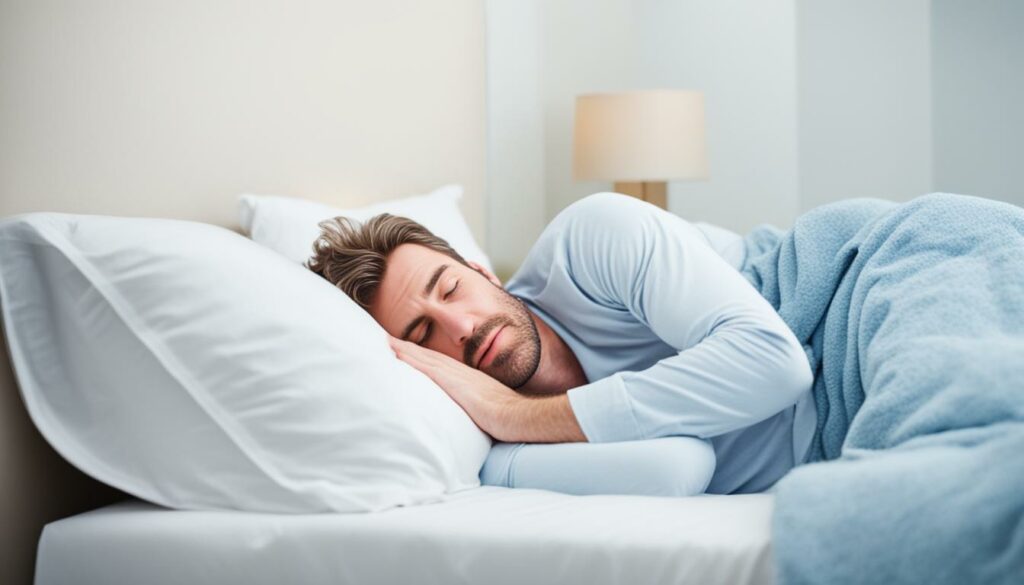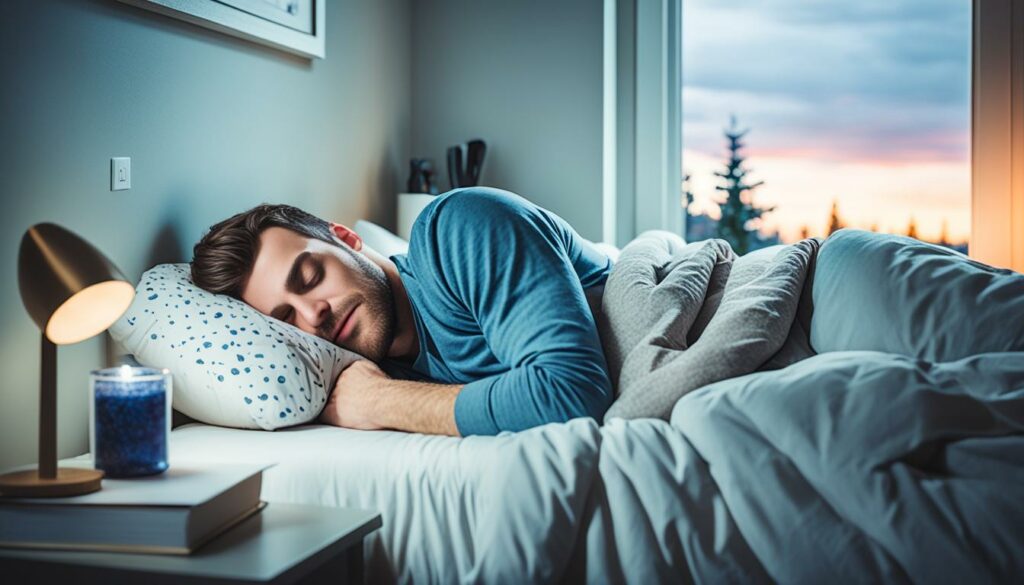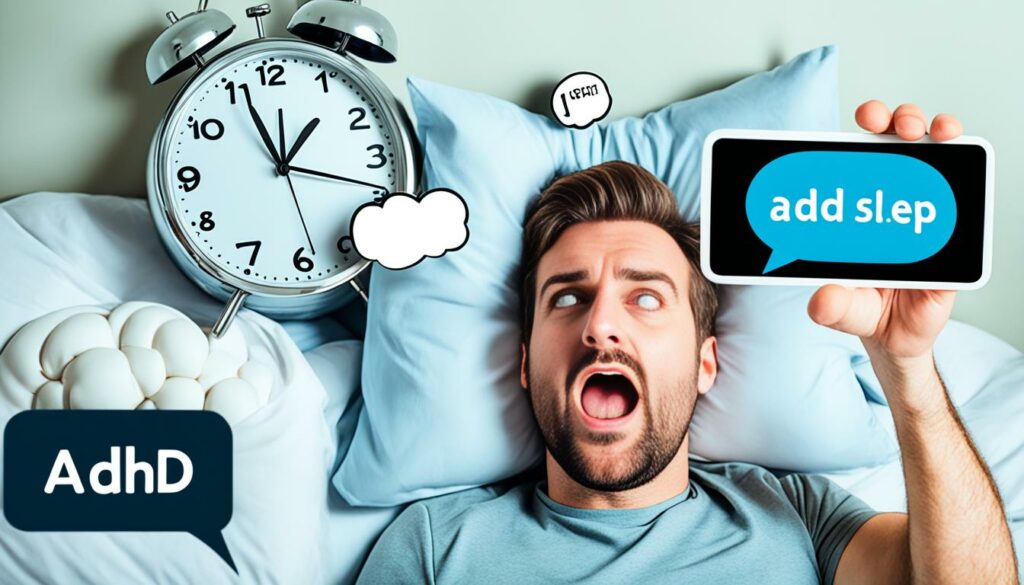Did you know that approximately 25% to 50% of people with ADHD also experience sleep troubles? Sleep is crucial for focus, mood, overall health, and well-being, but individuals with ADHD often struggle with sleep problems, leading to inadequate rest. These sleep issues can exacerbate daytime ADHD symptoms, making it crucial to find strategies that can help improve sleep in individuals with ADHD.
Key Takeaways:
- ADHD can often lead to sleep troubles, affecting approximately 25% to 50% of individuals with ADHD.
- Poor sleep can worsen ADHD symptoms and overall well-being.
- Strategies such as establishing a consistent bedtime routine, creating a sleep-friendly environment, and adopting healthy lifestyle habits can significantly improve sleep quality in individuals with ADHD.
- Medication adjustments and seeking professional help may be necessary for persistent sleep problems.
- Improving sleep can have a positive impact on ADHD symptoms and daily functioning.
The Relationship Between ADHD and Sleep
ADHD can impact sleep patterns in several ways. Individuals with ADHD often have difficulty sticking to a regular sleep schedule due to symptoms like distractibility and impulsivity. They may also have co-occurring sleep disorders such as insomnia, sleep apnea, or restless legs syndrome (RLS). Additionally, stimulant medications commonly used to treat ADHD can disrupt sleep. It is essential to understand the relationship between ADHD and sleep to effectively address sleep issues in individuals with ADHD.
ADHD and Sleep Patterns
One of the primary ways ADHD affects sleep is by disrupting sleep patterns. The difficulties individuals with ADHD face in maintaining a consistent sleep schedule can lead to irregular sleep patterns. This instability can result in insufficient sleep duration and poor sleep quality, exacerbating ADHD symptoms during waking hours.
Sleep Disorders in ADHD
In addition to irregular sleep patterns, individuals with ADHD are also more likely to experience various sleep disorders. Insomnia, characterized by difficulty falling asleep or staying asleep, is commonly observed in individuals with ADHD. Sleep apnea, a condition in which breathing repeatedly stops and starts during sleep, is another sleep disorder that can co-occur with ADHD. Restless legs syndrome (RLS), a neurological disorder causing an uncontrollable urge to move the legs while resting, is also more prevalent in individuals with ADHD.
Impact of ADHD Medications on Sleep
Stimulant medications, such as methylphenidate (Ritalin) or amphetamine-based drugs (Adderall), are commonly prescribed to manage ADHD symptoms. While these medications can be highly effective during the day, they can disrupt sleep at night. Stimulants may cause difficulty falling asleep or staying asleep, reducing overall sleep quality for individuals with ADHD.
“Sleep problems are prevalent in individuals with ADHD and can have a significant impact on their daily functioning. Understanding the relationship between ADHD and sleep is crucial in providing effective treatment and support.”
By recognizing the link between ADHD and sleep, individuals with ADHD and their healthcare providers can develop targeted strategies to improve sleep quality and mitigate the negative effects of sleep problems on ADHD symptoms. The next section will explore specific strategies for falling asleep with ADHD.
Strategies for Falling Asleep with ADHD
When it comes to falling asleep with ADHD, implementing effective strategies is essential for a restful night. By establishing a consistent bedtime routine and engaging in calming activities, individuals with ADHD can create an environment that promotes relaxation and sleep. Here are some strategies to consider:
Create a Relaxing Bedtime Routine
Establishing a bedtime routine can signal to the body that it is time to sleep. Including relaxing activities in this routine can help calm the ADHD mind and prepare for rest. Consider incorporating the following into your routine:
- Drinking a warm cup of caffeine-free tea
- Eating a light, nutritious snack
- Engaging in quiet time, such as reading a book or listening to calming music
- Taking a warm shower or bath
Cultivate Positive Thoughts
Positive thoughts play a crucial role in promoting a calm mindset before sleep. Practice gratitude or mindfulness exercises to shift your focus away from racing thoughts and quiet the mind. Emphasize positive aspects of your day or visualize peaceful scenes to promote relaxation.
Avoid Sleep-Disrupting Substances and Activities
It’s important to avoid substances and activities that can interfere with sleep. These can include alcohol and caffeine, which can disrupt sleep patterns and make it harder to fall asleep. Opt for decaffeinated beverages and avoid consuming them close to bedtime.
Remember, a calm and peaceful bedtime routine can greatly help in preparing the mind and body for sleep. It’s worth investing time and effort into establishing a routine that works best for you.
Incorporating these strategies into your nightly routine can be incredibly helpful in promoting better sleep with ADHD. By creating a peaceful and nurturing environment, calming the ADHD mind, and avoiding sleep-disrupting substances, you can improve your sleep quality and wake up feeling refreshed.

| Activity | Benefits |
|---|---|
| Drinking a warm cup of caffeine-free tea | Promotes relaxation and signals the body to prepare for sleep |
| Eating a light, nutritious snack | Provides a source of energy without causing discomfort or disrupting sleep |
| Engaging in quiet time, such as reading a book or listening to calming music | Calms the mind and helps shift focus away from racing thoughts |
| Taking a warm shower or bath | Relaxes the body and promotes a sense of cleanliness and comfort |
Creating a Sleep-Friendly Environment for ADHD
The sleep environment plays a crucial role in promoting restful sleep for individuals with ADHD. By optimizing the bedroom for sleep and implementing bedtime rituals, you can create a sleep-friendly environment that supports better sleep quality.
Comfort is Key
Start by ensuring that your mattress and pillows are comfortable and supportive. Investing in high-quality bedding can make a significant difference in your sleep experience.
Dim the Lights and Set the Temperature
Create a soothing atmosphere by dimming the lights in your bedroom. Using blackout curtains or an eye mask can help block out any excess light that may disrupt your sleep.
Maintain a cool temperature in your bedroom, as a cooler environment is generally more conducive to sleep. Experiment with different temperatures to find what works best for you.
Reduce Noise Distractions
Noise distractions can disrupt your sleep. Consider using earplugs or a white noise machine to drown out any unwanted sounds. You can also try listening to calming audiobooks or nature sounds to help relax your mind.
Maintain a Worry Notebook
If you find that your mind is racing with thoughts and worries before bed, try keeping a worry notebook. Write down any concerns or tasks that need to be addressed the next day, allowing yourself to let go of them temporarily and promoting a sense of calm before sleep.
Optimizing Your Bedroom for Sleep
| Aspect | Tips |
|————————–|————————————————————–|
| Comfortable Mattress | Invest in a high-quality mattress and pillows. |
| Dim the Lights | Use blackout curtains or an eye mask to block out light. |
| Maintain a Cool Temperature | Set the thermostat to a cooler temperature for better sleep. |
| Reduce Noise Distractions | Use earplugs, white noise machines, or calming sounds. |
| Maintain a Worry Notebook | Write down concerns to help clear your mind before sleep. |
By implementing these strategies, you can optimize your bedroom for sleep and create a sleep-friendly environment that enhances the quality of your rest. Remember, a calming and comfortable sleep environment can greatly contribute to better sleep in individuals with ADHD.
Lifestyle Factors for Better Sleep with ADHD
Certain lifestyle factors can significantly impact sleep in individuals with ADHD. By managing ADHD sleep disruptors and adjusting daily habits, individuals can improve their sleep quality and overall well-being.
Avoiding Sleep Disruptive Activities
One essential lifestyle factor for better sleep with ADHD is avoiding activities that hyperfocus the mind before bed. This includes minimizing the use of electronic devices, such as smartphones, tablets, and computers, in the evening. The blue light emitted by these devices can interfere with the body’s natural sleep-wake cycle and make it harder to fall asleep.
Restricting Consumption of Sleep Disruptive Substances
Another important factor is restricting the consumption of certain substances close to bedtime. Alcohol, sugary foods, and caffeine can all disrupt sleep patterns and make it more difficult to fall asleep. It’s crucial to avoid or minimize the intake of these substances, especially in the hours leading up to bedtime.
Engaging in Regular Exercise
Regular exercise can have a positive impact on sleep for individuals with ADHD. Engaging in physical activity during the day can help promote better sleep at night. However, it’s important to avoid exercising too close to bedtime, as it can increase alertness and make it harder to fall asleep.
Maintaining a Consistent Sleep Schedule
Establishing a consistent sleep schedule is another lifestyle factor that can improve sleep with ADHD. Going to bed and waking up at the same time every day helps regulate the body’s internal clock and promotes better sleep quality. It’s important to prioritize a consistent sleep routine, even on weekends or during vacations.
Consulting a Healthcare Provider
In some cases, consulting a healthcare provider can be beneficial for individuals with ADHD who are struggling with sleep. A healthcare provider can evaluate the specific sleep disruptors related to ADHD and provide guidance on potential supplements like melatonin or L-theanine. They can also offer personalized recommendations based on individual needs.

By managing lifestyle factors and adjusting daily habits, individuals with ADHD can improve their sleep and overall quality of life. Implementing these strategies can help minimize sleep disruptions and promote optimal rest, leading to better attention, focus, and overall well-being.
Medication and ADHD Sleep Issues
Medication is a commonly used treatment for managing ADHD symptoms, but it can also have an impact on sleep. In particular, stimulant medications, which are often prescribed for ADHD, may disrupt sleep patterns. It is important for individuals with ADHD to work closely with their healthcare provider to ensure that their medication is not negatively affecting their sleep.
Adjusting the dosage or timing of medication can help mitigate sleep disturbances caused by ADHD medications. By finding the right balance, individuals can manage their symptoms while still getting a good night’s rest. It is crucial to have open communication with healthcare providers to address any concerns about sleep issues.
Furthermore, it is essential to check iron levels and evaluate for co-occurring sleep disorders. Iron deficiency can impact sleep quality, and addressing it can alleviate sleep issues. Additionally, individuals with ADHD should be evaluated for other sleep disorders such as insomnia, sleep apnea, or restless legs syndrome (RLS) that may be contributing to their sleep problems.
Effects of ADHD Medications on Sleep
Stimulant medications, such as methylphenidate (e.g., Ritalin) and amphetamines (e.g., Adderall), are commonly prescribed to manage ADHD symptoms. While they can be effective in improving focus and attention during the day, these medications can interfere with sleep at night.
Some of the sleep effects associated with ADHD medications include:
- Delayed sleep onset: Stimulant medications can make it difficult for individuals with ADHD to fall asleep at night, leading to delayed sleep onset.
- Reduced total sleep time: Sleep duration may be shortened due to the stimulating effects of ADHD medications.
- Fragmented sleep: Medications can cause frequent awakenings during the night, resulting in fragmented sleep and less restorative rest.
- Daytime sleepiness: Poor quality sleep can lead to daytime sleepiness and difficulty maintaining focus and attention.
In addition to these sleep effects, some individuals may experience other side effects from ADHD medications that can further impact sleep, such as increased heart rate, dry mouth, or increased anxiety.
While medication is an essential part of managing ADHD symptoms, it is crucial to find the right balance to minimize any negative effects on sleep. Working closely with a healthcare provider is key to adjusting medication dosage or considering alternative medications that may have a lesser impact on sleep.

| ADHD Medication | Sleep Effects |
|---|---|
| Stimulant Medications (e.g., Ritalin, Adderall) | Delayed sleep onset Reduced total sleep time Fragmented sleep Daytime sleepiness |
| Non-stimulant Medications (e.g., Strattera, Intuniv) | May have less impact on sleep compared to stimulant medications |
Seeking Professional Help for ADHD and Sleep Problems
While many strategies for improving sleep with ADHD can be implemented independently, there are instances where professional help is necessary. If sleep problems persist despite implementing behavioral changes, it may be beneficial to consult a healthcare provider. They can evaluate for underlying sleep disorders, adjust medication, and provide appropriate interventions to address ADHD-related sleep issues.
Medical Interventions for ADHD-Related Sleep Issues
In some cases, medical interventions may be necessary to improve sleep in individuals with ADHD. Healthcare providers may recommend:
- Prescription sleep aids to help regulate sleep patterns and improve overall sleep quality.
- Behavioral therapies specifically designed to address sleep problems related to ADHD, such as cognitive-behavioral therapy for insomnia (CBT-I).
- Adjustments to ADHD medication dosage or timing to minimize sleep disturbances caused by stimulant medications.
- Screening for and treating co-occurring sleep disorders, such as sleep apnea or restless legs syndrome (RLS).
It is important to seek professional guidance when considering medical interventions for ADHD-related sleep issues. A healthcare provider can assess the individual’s unique situation and develop a tailored treatment plan that addresses their specific needs.

Conclusion
Sleep plays a vital role in the overall well-being and daily functioning of individuals with ADHD. By implementing effective strategies, such as creating a sleep-friendly environment, establishing a consistent bedtime routine, and adopting healthy lifestyle habits, individuals with ADHD can significantly improve their sleep quality and alleviate the impact of poor sleep on ADHD symptoms. It is important to prioritize sleep and take proactive steps to ensure a better night’s rest.
However, if sleep problems persist despite these strategies, seeking professional help is recommended. A comprehensive evaluation by a healthcare provider can help identify any underlying sleep disorders, adjust medication dosage or timing, and provide tailored interventions to address ADHD-related sleep issues. Professional guidance can make a meaningful difference in improving sleep outcomes for individuals with ADHD.
In summary, by implementing sleep strategies, individuals with ADHD can set the stage for restful and rejuvenating nights. Creating a sleep-conducive environment, following a consistent bedtime routine, adopting healthy lifestyle habits, and seeking professional help when needed are all essential steps to improve sleep quality and enhance overall well-being for individuals with ADHD.
